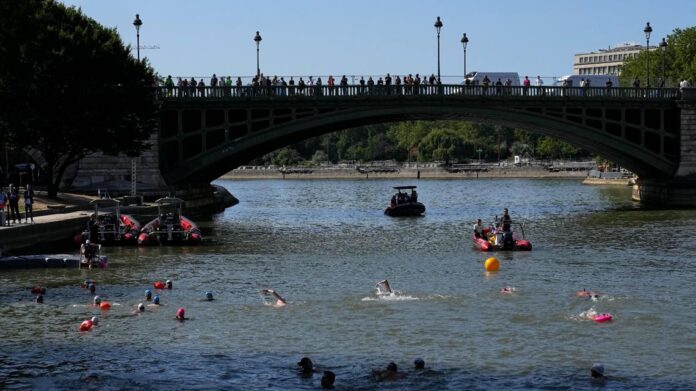Triathlon and marathon swimming events are scheduled to take place in the famed river running through Paris between July 30 and Aug. 5.
WASHINGTON — The Seine River has been an integral part of the Paris Olympics, serving as the main attraction for the Opening Ceremony and the scheduled site for an array of open-water swimming events.
The river, where it has been illegal to swim for more than a century, has undergone a massive overhaul as Paris prepared to host the Summer Games. Since 2015, the city invested roughly $1.5 billion in building infrastructure to catch more storm water when it rains, resulting in a cleaner and safer river for the Olympics and Parisians.
Despite the city’s efforts to clean up the long-polluted river, the water has tested unsafe for humans before and during the Games, and cleaner on other days.
What happens if the river isn’t clean enough for athletes to swim in?
Triathlon and marathon swimming events are scheduled to take place in the Seine between July 30 and Aug. 5.
If the water is deemed unsuitable for swimming, the events could be postponed for a few days.
In a worst-case scenario, Paris Olympic organizers have said that if heavy rain affects the Seine’s flow during the Games, the triathlon would no longer feature the swimming portion — and the marathon swimming competition would be relocated to the Vaires-sur-Marne Nautical Stadium in the greater Paris region.
“It’s not very common, but it has happened a few times,” Ollala Cernuda, head of communications at World Triathlon, an international body for the sport, said before the Games about the possibility of the swim portion being cancelled.
“And it’s always linked with water quality issues,” Cernuda said.
On a daily basis, the monitoring group Eau de Paris has tested the river water, yielding results that showed unsafe E. coli levels in June followed by results in early July that showed improvement.
Such improvements were enough for Paris Mayor Anne Hidalgo to take a dip in the Seine on July 17, just a few weeks before the Summer Games began. Hidalgo’s swim was part of a larger effort to showcase the river’s improved cleanliness.
Paris, like many old cities around the world, has a combined sewer system, which means that the city’s wastewater and stormwater flow through the same pipes. With heavy or prolonged periods of rain, the pipes’ capacity is reached, which means raw wastewater flows into the river instead of a treatment plant.
Organizers remain optimistic that drier, sunnier weather than what the French capital experienced in June will allow the events to go as planned — buffeted by the infrastructure upgrades.
